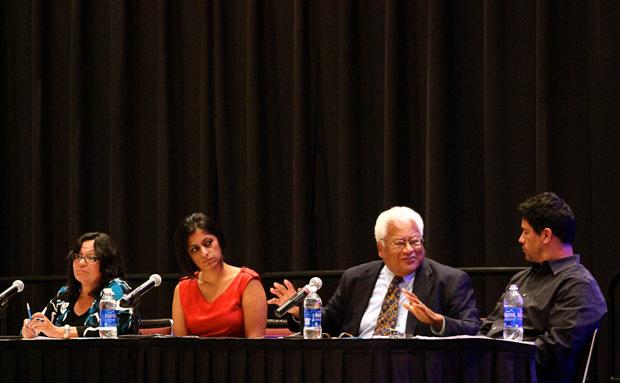 Voter suppression and statewide propositions were some of the topics discussed during the 2012 Election and Social Change forum that took place Wednesday night at the USU Northridge Center.
Voter suppression and statewide propositions were some of the topics discussed during the 2012 Election and Social Change forum that took place Wednesday night at the USU Northridge Center.
Activist Rev. James Lawson led panel members Theresa Montano, chicano studies professor, Alberto Retana of Community Coalition and Tanzela Ahmed of the Asian Pacific American Legal Center in a discussion to encourage students to vote.
The panel urged the audience to not only vote, but to spread the word about the election to combat voter disenfranchisement.
Montano stressed the importance of voting no on Proposition 32, which is funded by the Koch brothers to restrict the influence of labor unions, she said.
“Labor unions are the only things protecting public institutions from privatization,” Montano said.
Lawson also stressed the importance of voting no on Proposition 32 and restricting corporations from being able to give themselves tax breaks by silencing unions that organize against corporations.
“The Koch brothers are interested in power and control,” Lawson said.
The panel also discussed Proposition 30, which would raise taxes on those making more than $500,000 a year and prevent “trigger cuts” in funding to CSUs. The proposition would also put money back in students’ pockets, Ahmed said.
“If Prop. 30 fails, the message it sends is that we don’t care about the public good,” Montano said.
With his voice almost at a yell, Retana emphasized that the power to change the country is in the student’s hands, but that it will not happen by simply voting. People must get the apathetic involved and to the polls, he said.
“In 2042, the majority of people in the U.S. will be non-white,” Retana said. “But those numbers don’t mean things will change. The opposition wants a different kind of country. I encourage you to be part of the movement.”
Ahmed also focused on getting people to the polls, explaining that the system subtly suppresses the young by not explaining proper voter registration procedure once someone moves away from home for college.
The panel discussed the alleged voter suppression occurring in battleground states that are now requiring voter ID cards. The new laws, passed in states like Pennsylvania, require people to have state ID cards to vote, which disenfranchises senior citizens, the poor and minorities, Retana said.
The panel agreed that this was a ploy by republicans to hurt President Barack Obama’s chances at reelection.
“It’s not a coincidence that Republican votes are down and Democrat votes are up in those states (enforcing voter ID cards),” Montano said.
The panel showed displeasure with both major political parties, although most of their anger was focused at the Republican party.
“We shouldn’t let our criticism for Obama let us throw our vote away,” Lawson said. “Vote because 310 million people cannot afford a repetition of George W. Bush.”
Josh Khabushani, 20, health promotion major, attended the discussion questioning why his single vote matters in a country he feels is so corrupt at the top. The panel gave him a sense of empowerment and that he could make a difference.
“I still don’t believe that one vote will do anything in the big picture,” Khabushani said. “But I learned that it’s more of a journey to change people’s views and educate on issues.”




